HR Report: Traditional Interview Methods and Predictive Validity
VerifiedAdded on 2020/12/31
|13
|3008
|347
Report
AI Summary
This report delves into the crucial aspects of human resource management, emphasizing the significance of traditional interview methods in candidate selection. It outlines the processes involved in traditional interviews, highlighting their role in assessing candidate skills, personality, and suitability for organizational needs. The report further explores the concept of predictive validity, a key element in determining the effectiveness of selection processes and predicting future job performance. It discusses the importance of using tools and methods to enhance the predictive validity of interviews, such as quantitative research and standardized approaches. The analysis also addresses potential challenges in interview validity, including biases and unstructured formats, and suggests strategies for improvement, such as relying on multiple selection criteria and using real data for analysis. The report concludes by emphasizing the need for continuous evaluation and improvement of interview methods to ensure the selection of the best candidates and achieve optimal organizational outcomes. The report is designed to assist students with their HR assignments and is available on Desklib.
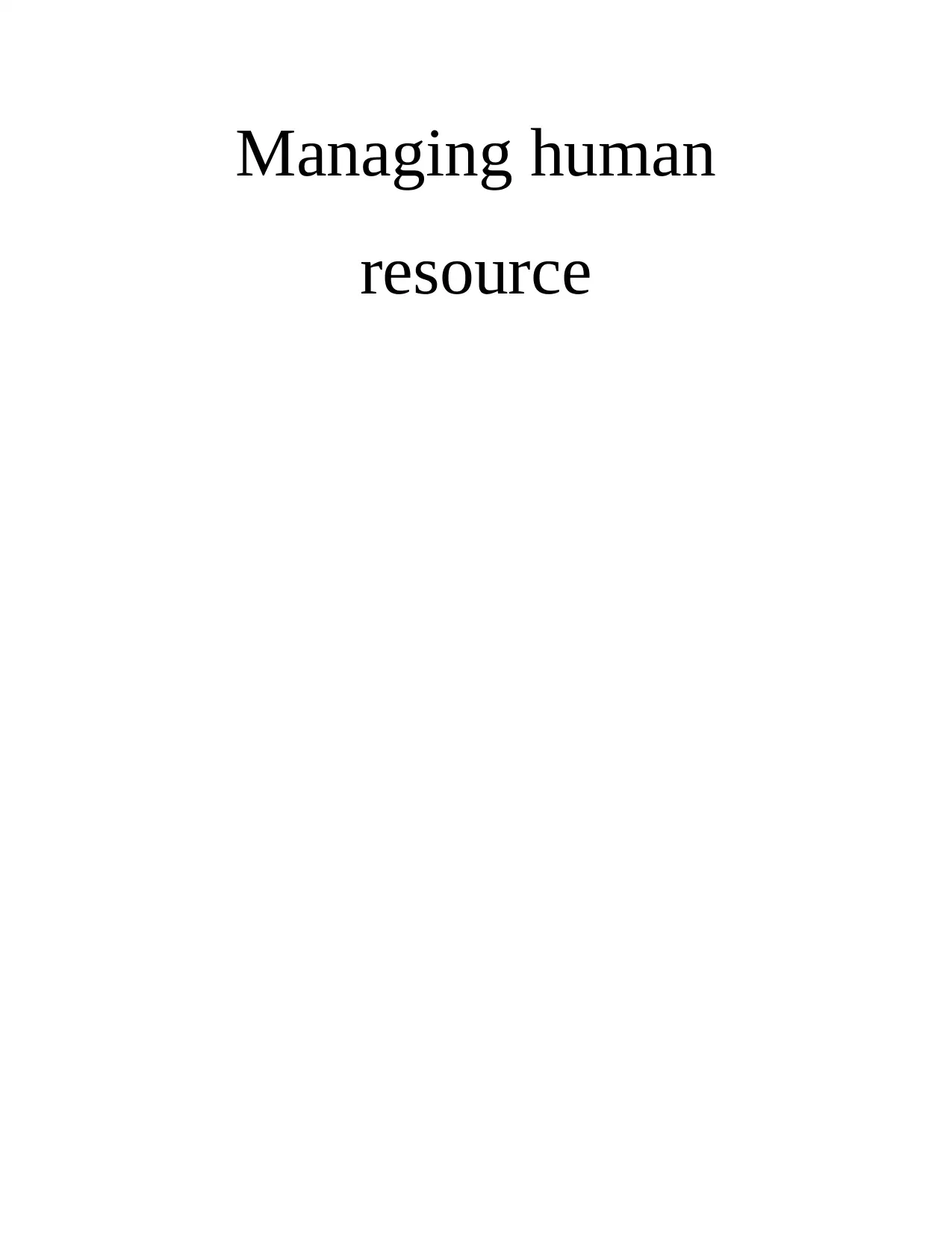
Managing human
resource
resource
Paraphrase This Document
Need a fresh take? Get an instant paraphrase of this document with our AI Paraphraser

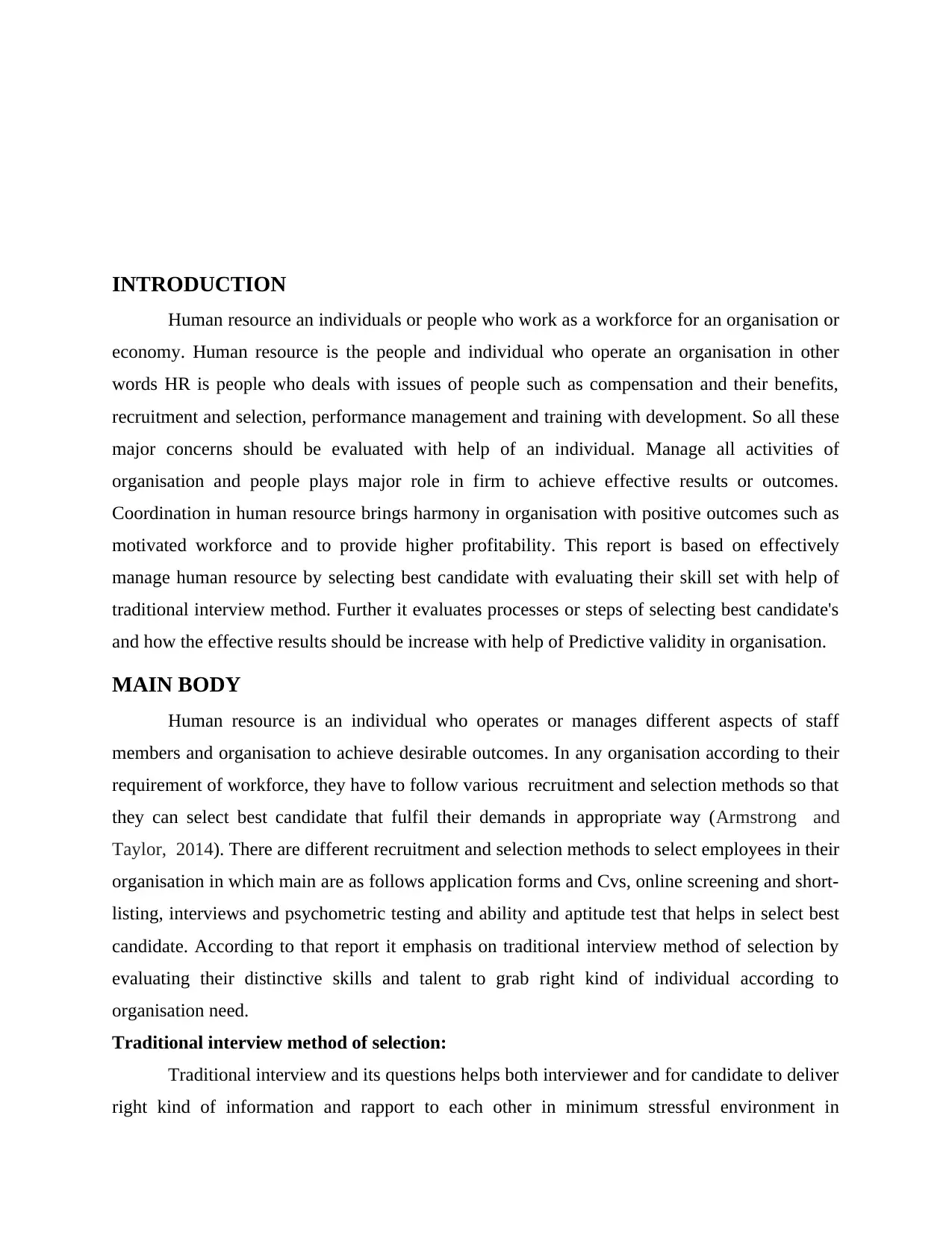
INTRODUCTION
Human resource an individuals or people who work as a workforce for an organisation or
economy. Human resource is the people and individual who operate an organisation in other
words HR is people who deals with issues of people such as compensation and their benefits,
recruitment and selection, performance management and training with development. So all these
major concerns should be evaluated with help of an individual. Manage all activities of
organisation and people plays major role in firm to achieve effective results or outcomes.
Coordination in human resource brings harmony in organisation with positive outcomes such as
motivated workforce and to provide higher profitability. This report is based on effectively
manage human resource by selecting best candidate with evaluating their skill set with help of
traditional interview method. Further it evaluates processes or steps of selecting best candidate's
and how the effective results should be increase with help of Predictive validity in organisation.
MAIN BODY
Human resource is an individual who operates or manages different aspects of staff
members and organisation to achieve desirable outcomes. In any organisation according to their
requirement of workforce, they have to follow various recruitment and selection methods so that
they can select best candidate that fulfil their demands in appropriate way (Armstrong and
Taylor, 2014). There are different recruitment and selection methods to select employees in their
organisation in which main are as follows application forms and Cvs, online screening and short-
listing, interviews and psychometric testing and ability and aptitude test that helps in select best
candidate. According to that report it emphasis on traditional interview method of selection by
evaluating their distinctive skills and talent to grab right kind of individual according to
organisation need.
Traditional interview method of selection:
Traditional interview and its questions helps both interviewer and for candidate to deliver
right kind of information and rapport to each other in minimum stressful environment in
Human resource an individuals or people who work as a workforce for an organisation or
economy. Human resource is the people and individual who operate an organisation in other
words HR is people who deals with issues of people such as compensation and their benefits,
recruitment and selection, performance management and training with development. So all these
major concerns should be evaluated with help of an individual. Manage all activities of
organisation and people plays major role in firm to achieve effective results or outcomes.
Coordination in human resource brings harmony in organisation with positive outcomes such as
motivated workforce and to provide higher profitability. This report is based on effectively
manage human resource by selecting best candidate with evaluating their skill set with help of
traditional interview method. Further it evaluates processes or steps of selecting best candidate's
and how the effective results should be increase with help of Predictive validity in organisation.
MAIN BODY
Human resource is an individual who operates or manages different aspects of staff
members and organisation to achieve desirable outcomes. In any organisation according to their
requirement of workforce, they have to follow various recruitment and selection methods so that
they can select best candidate that fulfil their demands in appropriate way (Armstrong and
Taylor, 2014). There are different recruitment and selection methods to select employees in their
organisation in which main are as follows application forms and Cvs, online screening and short-
listing, interviews and psychometric testing and ability and aptitude test that helps in select best
candidate. According to that report it emphasis on traditional interview method of selection by
evaluating their distinctive skills and talent to grab right kind of individual according to
organisation need.
Traditional interview method of selection:
Traditional interview and its questions helps both interviewer and for candidate to deliver
right kind of information and rapport to each other in minimum stressful environment in
⊘ This is a preview!⊘
Do you want full access?
Subscribe today to unlock all pages.

Trusted by 1+ million students worldwide
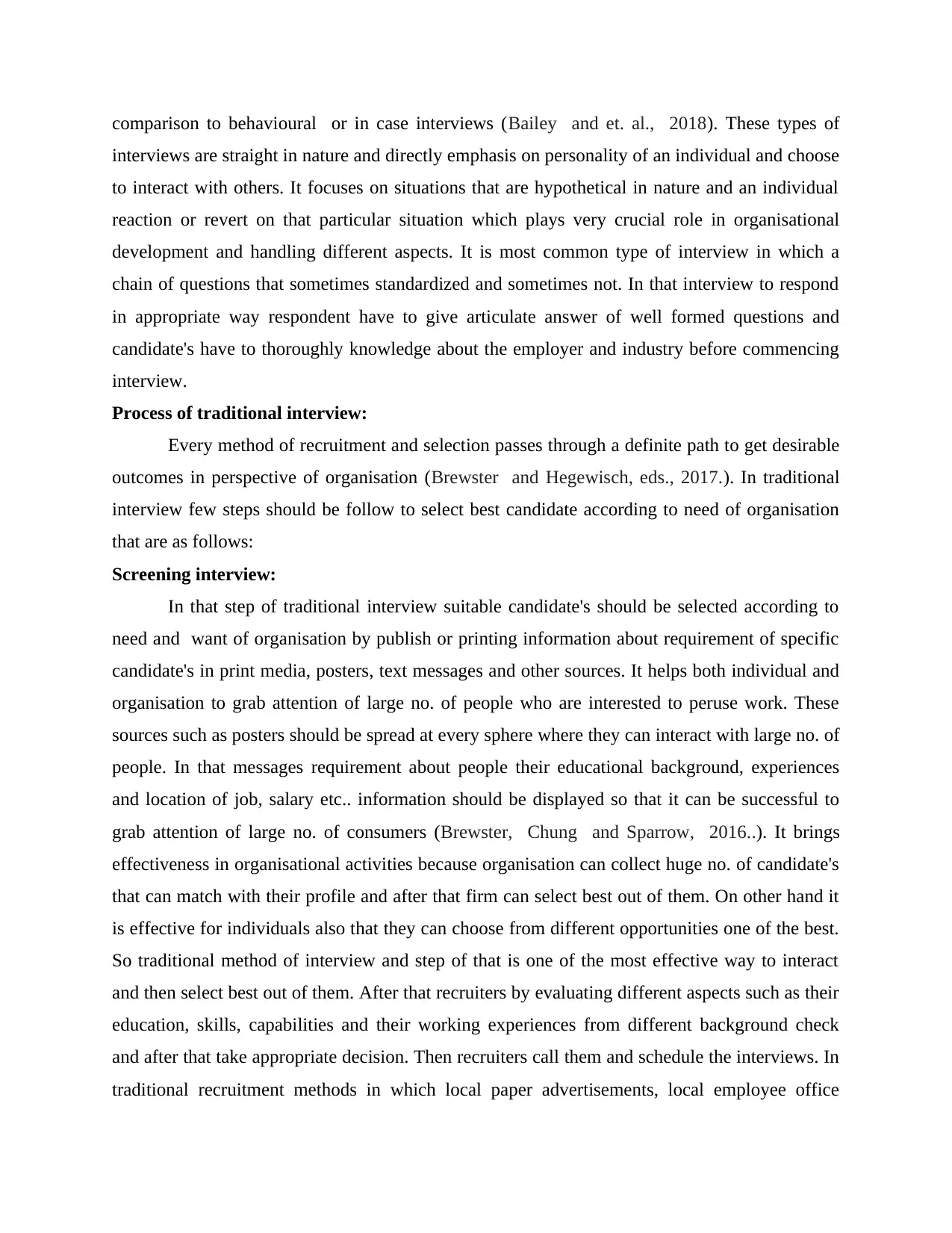
comparison to behavioural or in case interviews (Bailey and et. al., 2018). These types of
interviews are straight in nature and directly emphasis on personality of an individual and choose
to interact with others. It focuses on situations that are hypothetical in nature and an individual
reaction or revert on that particular situation which plays very crucial role in organisational
development and handling different aspects. It is most common type of interview in which a
chain of questions that sometimes standardized and sometimes not. In that interview to respond
in appropriate way respondent have to give articulate answer of well formed questions and
candidate's have to thoroughly knowledge about the employer and industry before commencing
interview.
Process of traditional interview:
Every method of recruitment and selection passes through a definite path to get desirable
outcomes in perspective of organisation (Brewster and Hegewisch, eds., 2017.). In traditional
interview few steps should be follow to select best candidate according to need of organisation
that are as follows:
Screening interview:
In that step of traditional interview suitable candidate's should be selected according to
need and want of organisation by publish or printing information about requirement of specific
candidate's in print media, posters, text messages and other sources. It helps both individual and
organisation to grab attention of large no. of people who are interested to peruse work. These
sources such as posters should be spread at every sphere where they can interact with large no. of
people. In that messages requirement about people their educational background, experiences
and location of job, salary etc.. information should be displayed so that it can be successful to
grab attention of large no. of consumers (Brewster, Chung and Sparrow, 2016..). It brings
effectiveness in organisational activities because organisation can collect huge no. of candidate's
that can match with their profile and after that firm can select best out of them. On other hand it
is effective for individuals also that they can choose from different opportunities one of the best.
So traditional method of interview and step of that is one of the most effective way to interact
and then select best out of them. After that recruiters by evaluating different aspects such as their
education, skills, capabilities and their working experiences from different background check
and after that take appropriate decision. Then recruiters call them and schedule the interviews. In
traditional recruitment methods in which local paper advertisements, local employee office
interviews are straight in nature and directly emphasis on personality of an individual and choose
to interact with others. It focuses on situations that are hypothetical in nature and an individual
reaction or revert on that particular situation which plays very crucial role in organisational
development and handling different aspects. It is most common type of interview in which a
chain of questions that sometimes standardized and sometimes not. In that interview to respond
in appropriate way respondent have to give articulate answer of well formed questions and
candidate's have to thoroughly knowledge about the employer and industry before commencing
interview.
Process of traditional interview:
Every method of recruitment and selection passes through a definite path to get desirable
outcomes in perspective of organisation (Brewster and Hegewisch, eds., 2017.). In traditional
interview few steps should be follow to select best candidate according to need of organisation
that are as follows:
Screening interview:
In that step of traditional interview suitable candidate's should be selected according to
need and want of organisation by publish or printing information about requirement of specific
candidate's in print media, posters, text messages and other sources. It helps both individual and
organisation to grab attention of large no. of people who are interested to peruse work. These
sources such as posters should be spread at every sphere where they can interact with large no. of
people. In that messages requirement about people their educational background, experiences
and location of job, salary etc.. information should be displayed so that it can be successful to
grab attention of large no. of consumers (Brewster, Chung and Sparrow, 2016..). It brings
effectiveness in organisational activities because organisation can collect huge no. of candidate's
that can match with their profile and after that firm can select best out of them. On other hand it
is effective for individuals also that they can choose from different opportunities one of the best.
So traditional method of interview and step of that is one of the most effective way to interact
and then select best out of them. After that recruiters by evaluating different aspects such as their
education, skills, capabilities and their working experiences from different background check
and after that take appropriate decision. Then recruiters call them and schedule the interviews. In
traditional recruitment methods in which local paper advertisements, local employee office
Paraphrase This Document
Need a fresh take? Get an instant paraphrase of this document with our AI Paraphraser
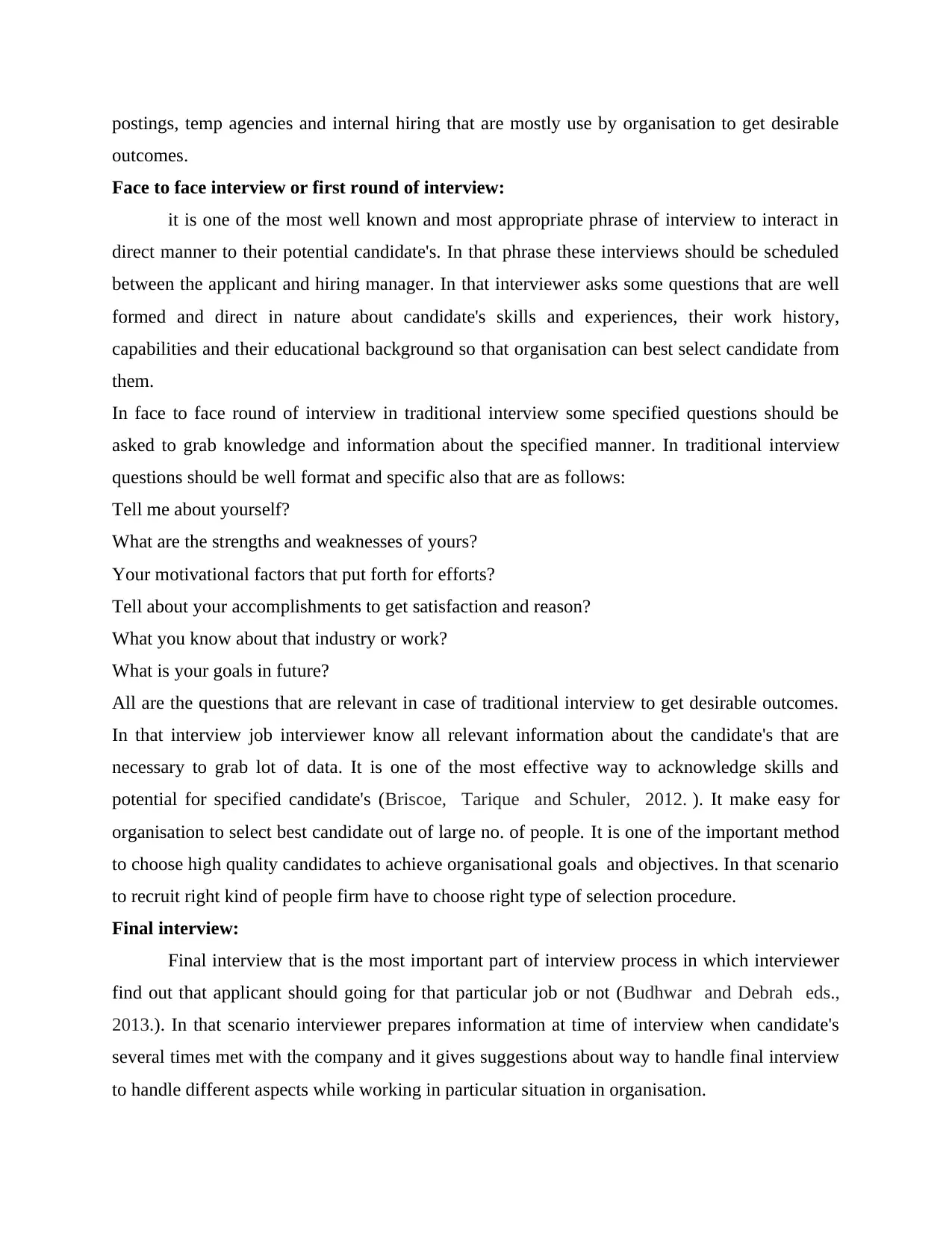
postings, temp agencies and internal hiring that are mostly use by organisation to get desirable
outcomes.
Face to face interview or first round of interview:
it is one of the most well known and most appropriate phrase of interview to interact in
direct manner to their potential candidate's. In that phrase these interviews should be scheduled
between the applicant and hiring manager. In that interviewer asks some questions that are well
formed and direct in nature about candidate's skills and experiences, their work history,
capabilities and their educational background so that organisation can best select candidate from
them.
In face to face round of interview in traditional interview some specified questions should be
asked to grab knowledge and information about the specified manner. In traditional interview
questions should be well format and specific also that are as follows:
Tell me about yourself?
What are the strengths and weaknesses of yours?
Your motivational factors that put forth for efforts?
Tell about your accomplishments to get satisfaction and reason?
What you know about that industry or work?
What is your goals in future?
All are the questions that are relevant in case of traditional interview to get desirable outcomes.
In that interview job interviewer know all relevant information about the candidate's that are
necessary to grab lot of data. It is one of the most effective way to acknowledge skills and
potential for specified candidate's (Briscoe, Tarique and Schuler, 2012. ). It make easy for
organisation to select best candidate out of large no. of people. It is one of the important method
to choose high quality candidates to achieve organisational goals and objectives. In that scenario
to recruit right kind of people firm have to choose right type of selection procedure.
Final interview:
Final interview that is the most important part of interview process in which interviewer
find out that applicant should going for that particular job or not (Budhwar and Debrah eds.,
2013.). In that scenario interviewer prepares information at time of interview when candidate's
several times met with the company and it gives suggestions about way to handle final interview
to handle different aspects while working in particular situation in organisation.
outcomes.
Face to face interview or first round of interview:
it is one of the most well known and most appropriate phrase of interview to interact in
direct manner to their potential candidate's. In that phrase these interviews should be scheduled
between the applicant and hiring manager. In that interviewer asks some questions that are well
formed and direct in nature about candidate's skills and experiences, their work history,
capabilities and their educational background so that organisation can best select candidate from
them.
In face to face round of interview in traditional interview some specified questions should be
asked to grab knowledge and information about the specified manner. In traditional interview
questions should be well format and specific also that are as follows:
Tell me about yourself?
What are the strengths and weaknesses of yours?
Your motivational factors that put forth for efforts?
Tell about your accomplishments to get satisfaction and reason?
What you know about that industry or work?
What is your goals in future?
All are the questions that are relevant in case of traditional interview to get desirable outcomes.
In that interview job interviewer know all relevant information about the candidate's that are
necessary to grab lot of data. It is one of the most effective way to acknowledge skills and
potential for specified candidate's (Briscoe, Tarique and Schuler, 2012. ). It make easy for
organisation to select best candidate out of large no. of people. It is one of the important method
to choose high quality candidates to achieve organisational goals and objectives. In that scenario
to recruit right kind of people firm have to choose right type of selection procedure.
Final interview:
Final interview that is the most important part of interview process in which interviewer
find out that applicant should going for that particular job or not (Budhwar and Debrah eds.,
2013.). In that scenario interviewer prepares information at time of interview when candidate's
several times met with the company and it gives suggestions about way to handle final interview
to handle different aspects while working in particular situation in organisation.
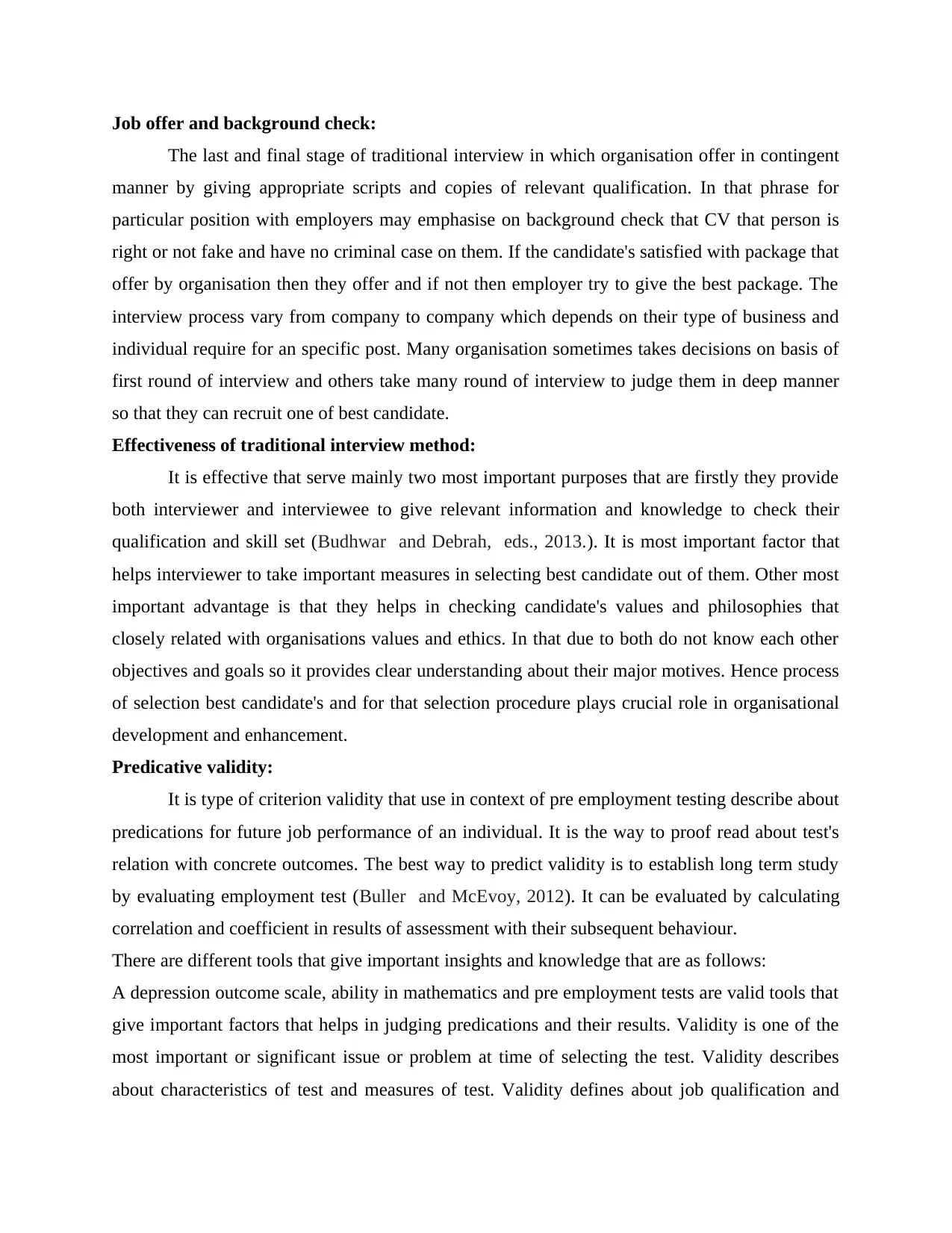
Job offer and background check:
The last and final stage of traditional interview in which organisation offer in contingent
manner by giving appropriate scripts and copies of relevant qualification. In that phrase for
particular position with employers may emphasise on background check that CV that person is
right or not fake and have no criminal case on them. If the candidate's satisfied with package that
offer by organisation then they offer and if not then employer try to give the best package. The
interview process vary from company to company which depends on their type of business and
individual require for an specific post. Many organisation sometimes takes decisions on basis of
first round of interview and others take many round of interview to judge them in deep manner
so that they can recruit one of best candidate.
Effectiveness of traditional interview method:
It is effective that serve mainly two most important purposes that are firstly they provide
both interviewer and interviewee to give relevant information and knowledge to check their
qualification and skill set (Budhwar and Debrah, eds., 2013.). It is most important factor that
helps interviewer to take important measures in selecting best candidate out of them. Other most
important advantage is that they helps in checking candidate's values and philosophies that
closely related with organisations values and ethics. In that due to both do not know each other
objectives and goals so it provides clear understanding about their major motives. Hence process
of selection best candidate's and for that selection procedure plays crucial role in organisational
development and enhancement.
Predicative validity:
It is type of criterion validity that use in context of pre employment testing describe about
predications for future job performance of an individual. It is the way to proof read about test's
relation with concrete outcomes. The best way to predict validity is to establish long term study
by evaluating employment test (Buller and McEvoy, 2012). It can be evaluated by calculating
correlation and coefficient in results of assessment with their subsequent behaviour.
There are different tools that give important insights and knowledge that are as follows:
A depression outcome scale, ability in mathematics and pre employment tests are valid tools that
give important factors that helps in judging predications and their results. Validity is one of the
most important or significant issue or problem at time of selecting the test. Validity describes
about characteristics of test and measures of test. Validity defines about job qualification and
The last and final stage of traditional interview in which organisation offer in contingent
manner by giving appropriate scripts and copies of relevant qualification. In that phrase for
particular position with employers may emphasise on background check that CV that person is
right or not fake and have no criminal case on them. If the candidate's satisfied with package that
offer by organisation then they offer and if not then employer try to give the best package. The
interview process vary from company to company which depends on their type of business and
individual require for an specific post. Many organisation sometimes takes decisions on basis of
first round of interview and others take many round of interview to judge them in deep manner
so that they can recruit one of best candidate.
Effectiveness of traditional interview method:
It is effective that serve mainly two most important purposes that are firstly they provide
both interviewer and interviewee to give relevant information and knowledge to check their
qualification and skill set (Budhwar and Debrah, eds., 2013.). It is most important factor that
helps interviewer to take important measures in selecting best candidate out of them. Other most
important advantage is that they helps in checking candidate's values and philosophies that
closely related with organisations values and ethics. In that due to both do not know each other
objectives and goals so it provides clear understanding about their major motives. Hence process
of selection best candidate's and for that selection procedure plays crucial role in organisational
development and enhancement.
Predicative validity:
It is type of criterion validity that use in context of pre employment testing describe about
predications for future job performance of an individual. It is the way to proof read about test's
relation with concrete outcomes. The best way to predict validity is to establish long term study
by evaluating employment test (Buller and McEvoy, 2012). It can be evaluated by calculating
correlation and coefficient in results of assessment with their subsequent behaviour.
There are different tools that give important insights and knowledge that are as follows:
A depression outcome scale, ability in mathematics and pre employment tests are valid tools that
give important factors that helps in judging predications and their results. Validity is one of the
most important or significant issue or problem at time of selecting the test. Validity describes
about characteristics of test and measures of test. Validity defines about job qualification and
⊘ This is a preview!⊘
Do you want full access?
Subscribe today to unlock all pages.

Trusted by 1+ million students worldwide
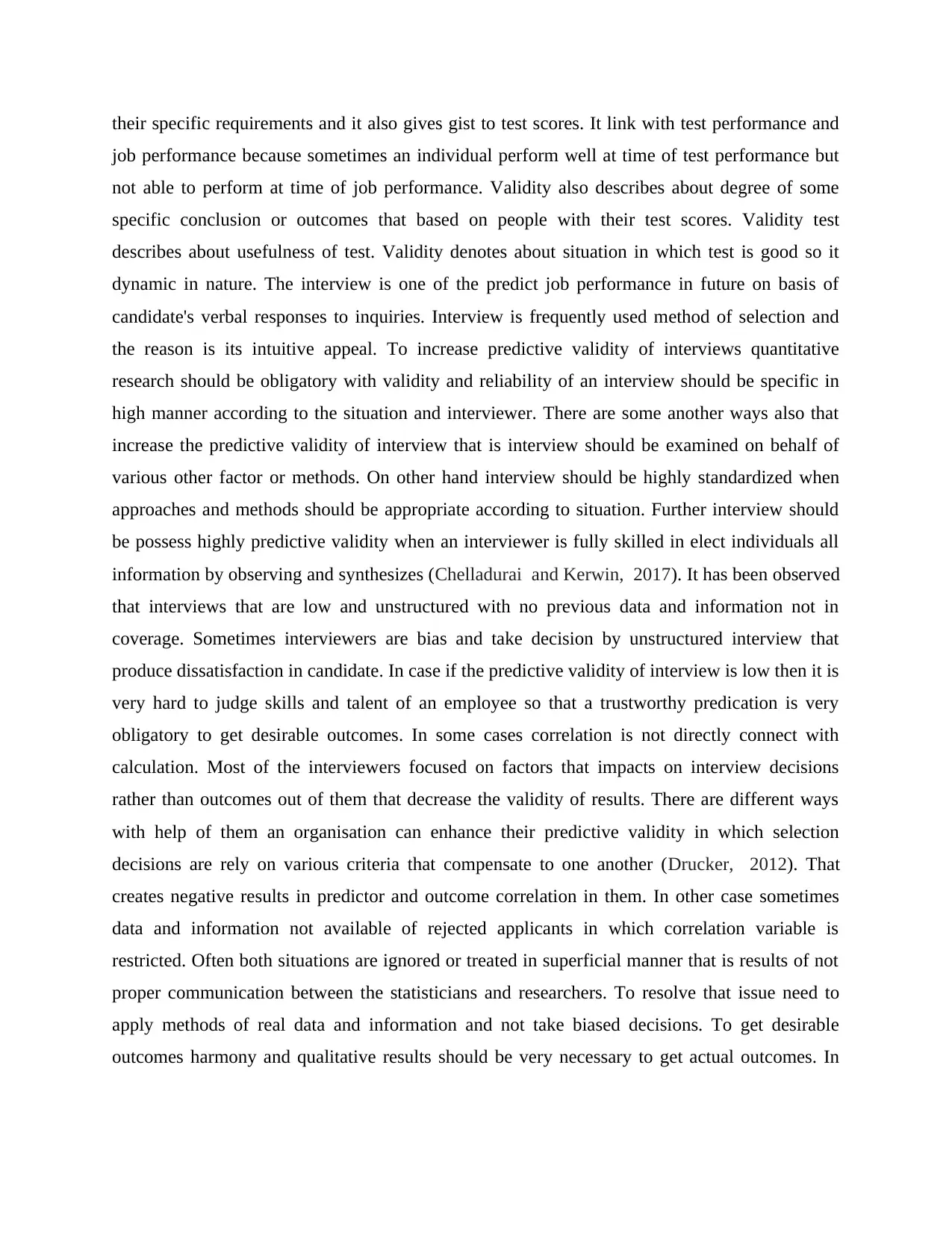
their specific requirements and it also gives gist to test scores. It link with test performance and
job performance because sometimes an individual perform well at time of test performance but
not able to perform at time of job performance. Validity also describes about degree of some
specific conclusion or outcomes that based on people with their test scores. Validity test
describes about usefulness of test. Validity denotes about situation in which test is good so it
dynamic in nature. The interview is one of the predict job performance in future on basis of
candidate's verbal responses to inquiries. Interview is frequently used method of selection and
the reason is its intuitive appeal. To increase predictive validity of interviews quantitative
research should be obligatory with validity and reliability of an interview should be specific in
high manner according to the situation and interviewer. There are some another ways also that
increase the predictive validity of interview that is interview should be examined on behalf of
various other factor or methods. On other hand interview should be highly standardized when
approaches and methods should be appropriate according to situation. Further interview should
be possess highly predictive validity when an interviewer is fully skilled in elect individuals all
information by observing and synthesizes (Chelladurai and Kerwin, 2017). It has been observed
that interviews that are low and unstructured with no previous data and information not in
coverage. Sometimes interviewers are bias and take decision by unstructured interview that
produce dissatisfaction in candidate. In case if the predictive validity of interview is low then it is
very hard to judge skills and talent of an employee so that a trustworthy predication is very
obligatory to get desirable outcomes. In some cases correlation is not directly connect with
calculation. Most of the interviewers focused on factors that impacts on interview decisions
rather than outcomes out of them that decrease the validity of results. There are different ways
with help of them an organisation can enhance their predictive validity in which selection
decisions are rely on various criteria that compensate to one another (Drucker, 2012). That
creates negative results in predictor and outcome correlation in them. In other case sometimes
data and information not available of rejected applicants in which correlation variable is
restricted. Often both situations are ignored or treated in superficial manner that is results of not
proper communication between the statisticians and researchers. To resolve that issue need to
apply methods of real data and information and not take biased decisions. To get desirable
outcomes harmony and qualitative results should be very necessary to get actual outcomes. In
job performance because sometimes an individual perform well at time of test performance but
not able to perform at time of job performance. Validity also describes about degree of some
specific conclusion or outcomes that based on people with their test scores. Validity test
describes about usefulness of test. Validity denotes about situation in which test is good so it
dynamic in nature. The interview is one of the predict job performance in future on basis of
candidate's verbal responses to inquiries. Interview is frequently used method of selection and
the reason is its intuitive appeal. To increase predictive validity of interviews quantitative
research should be obligatory with validity and reliability of an interview should be specific in
high manner according to the situation and interviewer. There are some another ways also that
increase the predictive validity of interview that is interview should be examined on behalf of
various other factor or methods. On other hand interview should be highly standardized when
approaches and methods should be appropriate according to situation. Further interview should
be possess highly predictive validity when an interviewer is fully skilled in elect individuals all
information by observing and synthesizes (Chelladurai and Kerwin, 2017). It has been observed
that interviews that are low and unstructured with no previous data and information not in
coverage. Sometimes interviewers are bias and take decision by unstructured interview that
produce dissatisfaction in candidate. In case if the predictive validity of interview is low then it is
very hard to judge skills and talent of an employee so that a trustworthy predication is very
obligatory to get desirable outcomes. In some cases correlation is not directly connect with
calculation. Most of the interviewers focused on factors that impacts on interview decisions
rather than outcomes out of them that decrease the validity of results. There are different ways
with help of them an organisation can enhance their predictive validity in which selection
decisions are rely on various criteria that compensate to one another (Drucker, 2012). That
creates negative results in predictor and outcome correlation in them. In other case sometimes
data and information not available of rejected applicants in which correlation variable is
restricted. Often both situations are ignored or treated in superficial manner that is results of not
proper communication between the statisticians and researchers. To resolve that issue need to
apply methods of real data and information and not take biased decisions. To get desirable
outcomes harmony and qualitative results should be very necessary to get actual outcomes. In
Paraphrase This Document
Need a fresh take? Get an instant paraphrase of this document with our AI Paraphraser
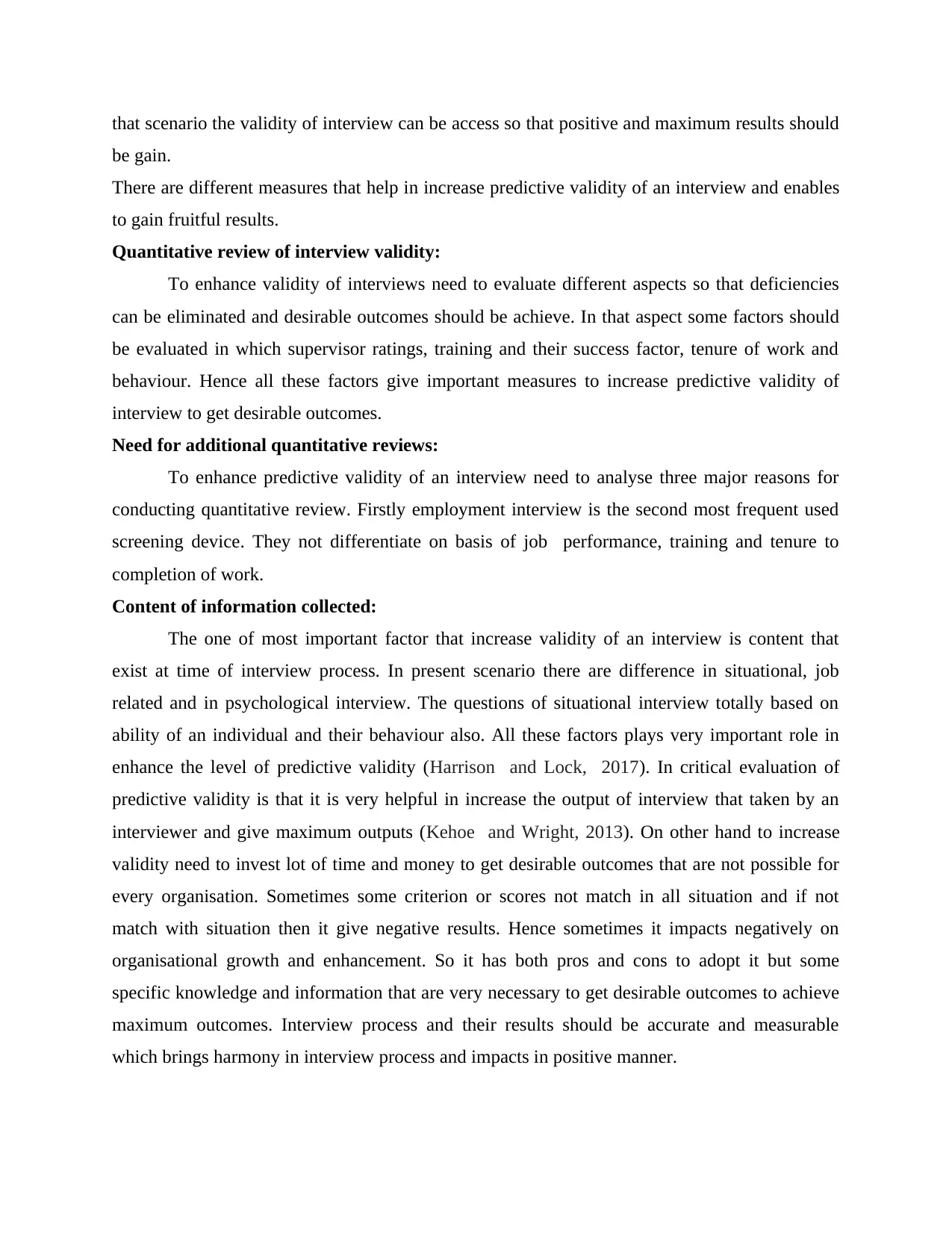
that scenario the validity of interview can be access so that positive and maximum results should
be gain.
There are different measures that help in increase predictive validity of an interview and enables
to gain fruitful results.
Quantitative review of interview validity:
To enhance validity of interviews need to evaluate different aspects so that deficiencies
can be eliminated and desirable outcomes should be achieve. In that aspect some factors should
be evaluated in which supervisor ratings, training and their success factor, tenure of work and
behaviour. Hence all these factors give important measures to increase predictive validity of
interview to get desirable outcomes.
Need for additional quantitative reviews:
To enhance predictive validity of an interview need to analyse three major reasons for
conducting quantitative review. Firstly employment interview is the second most frequent used
screening device. They not differentiate on basis of job performance, training and tenure to
completion of work.
Content of information collected:
The one of most important factor that increase validity of an interview is content that
exist at time of interview process. In present scenario there are difference in situational, job
related and in psychological interview. The questions of situational interview totally based on
ability of an individual and their behaviour also. All these factors plays very important role in
enhance the level of predictive validity (Harrison and Lock, 2017). In critical evaluation of
predictive validity is that it is very helpful in increase the output of interview that taken by an
interviewer and give maximum outputs (Kehoe and Wright, 2013). On other hand to increase
validity need to invest lot of time and money to get desirable outcomes that are not possible for
every organisation. Sometimes some criterion or scores not match in all situation and if not
match with situation then it give negative results. Hence sometimes it impacts negatively on
organisational growth and enhancement. So it has both pros and cons to adopt it but some
specific knowledge and information that are very necessary to get desirable outcomes to achieve
maximum outcomes. Interview process and their results should be accurate and measurable
which brings harmony in interview process and impacts in positive manner.
be gain.
There are different measures that help in increase predictive validity of an interview and enables
to gain fruitful results.
Quantitative review of interview validity:
To enhance validity of interviews need to evaluate different aspects so that deficiencies
can be eliminated and desirable outcomes should be achieve. In that aspect some factors should
be evaluated in which supervisor ratings, training and their success factor, tenure of work and
behaviour. Hence all these factors give important measures to increase predictive validity of
interview to get desirable outcomes.
Need for additional quantitative reviews:
To enhance predictive validity of an interview need to analyse three major reasons for
conducting quantitative review. Firstly employment interview is the second most frequent used
screening device. They not differentiate on basis of job performance, training and tenure to
completion of work.
Content of information collected:
The one of most important factor that increase validity of an interview is content that
exist at time of interview process. In present scenario there are difference in situational, job
related and in psychological interview. The questions of situational interview totally based on
ability of an individual and their behaviour also. All these factors plays very important role in
enhance the level of predictive validity (Harrison and Lock, 2017). In critical evaluation of
predictive validity is that it is very helpful in increase the output of interview that taken by an
interviewer and give maximum outputs (Kehoe and Wright, 2013). On other hand to increase
validity need to invest lot of time and money to get desirable outcomes that are not possible for
every organisation. Sometimes some criterion or scores not match in all situation and if not
match with situation then it give negative results. Hence sometimes it impacts negatively on
organisational growth and enhancement. So it has both pros and cons to adopt it but some
specific knowledge and information that are very necessary to get desirable outcomes to achieve
maximum outcomes. Interview process and their results should be accurate and measurable
which brings harmony in interview process and impacts in positive manner.
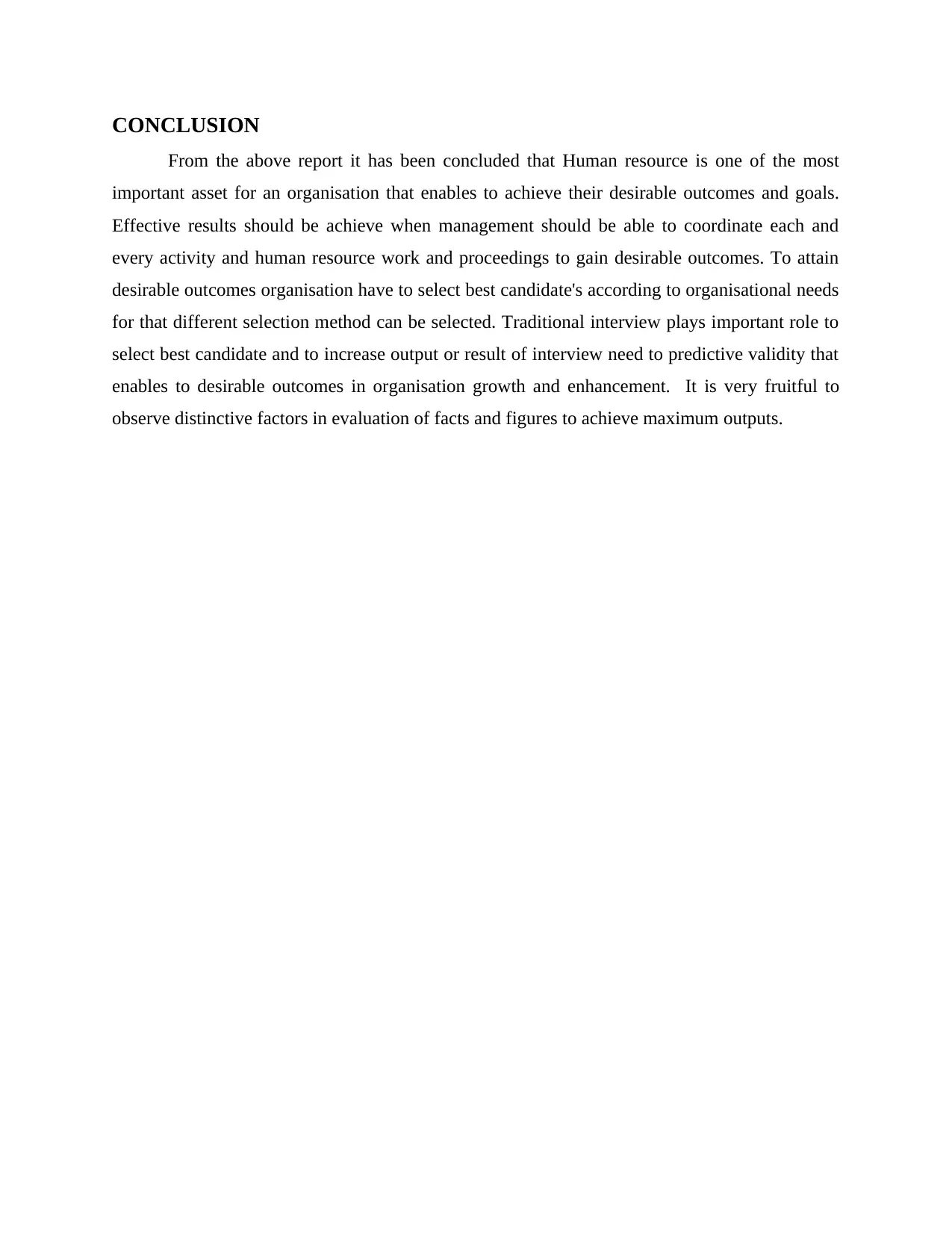
CONCLUSION
From the above report it has been concluded that Human resource is one of the most
important asset for an organisation that enables to achieve their desirable outcomes and goals.
Effective results should be achieve when management should be able to coordinate each and
every activity and human resource work and proceedings to gain desirable outcomes. To attain
desirable outcomes organisation have to select best candidate's according to organisational needs
for that different selection method can be selected. Traditional interview plays important role to
select best candidate and to increase output or result of interview need to predictive validity that
enables to desirable outcomes in organisation growth and enhancement. It is very fruitful to
observe distinctive factors in evaluation of facts and figures to achieve maximum outputs.
From the above report it has been concluded that Human resource is one of the most
important asset for an organisation that enables to achieve their desirable outcomes and goals.
Effective results should be achieve when management should be able to coordinate each and
every activity and human resource work and proceedings to gain desirable outcomes. To attain
desirable outcomes organisation have to select best candidate's according to organisational needs
for that different selection method can be selected. Traditional interview plays important role to
select best candidate and to increase output or result of interview need to predictive validity that
enables to desirable outcomes in organisation growth and enhancement. It is very fruitful to
observe distinctive factors in evaluation of facts and figures to achieve maximum outputs.
⊘ This is a preview!⊘
Do you want full access?
Subscribe today to unlock all pages.

Trusted by 1+ million students worldwide
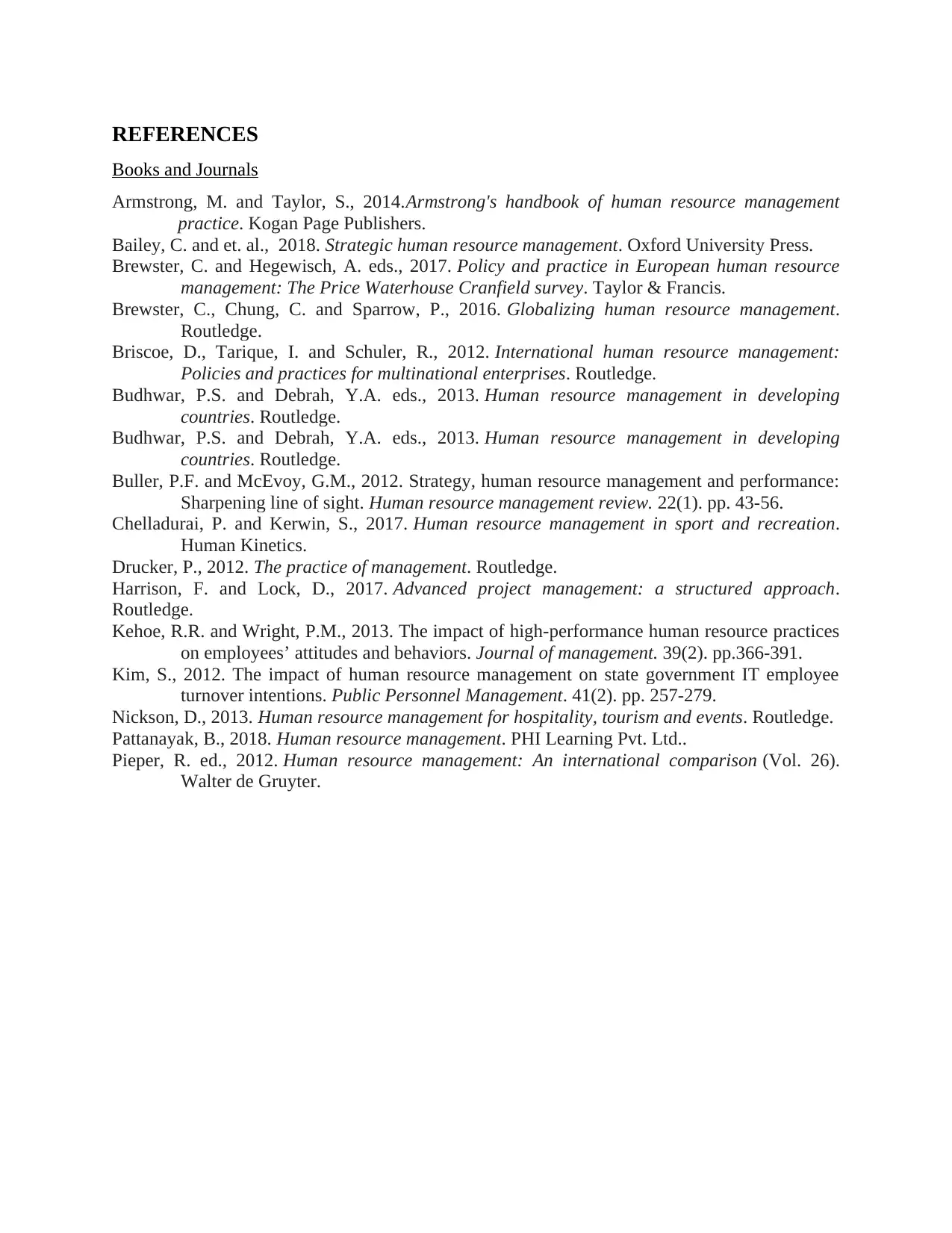
REFERENCES
Books and Journals
Armstrong, M. and Taylor, S., 2014.Armstrong's handbook of human resource management
practice. Kogan Page Publishers.
Bailey, C. and et. al., 2018. Strategic human resource management. Oxford University Press.
Brewster, C. and Hegewisch, A. eds., 2017. Policy and practice in European human resource
management: The Price Waterhouse Cranfield survey. Taylor & Francis.
Brewster, C., Chung, C. and Sparrow, P., 2016. Globalizing human resource management.
Routledge.
Briscoe, D., Tarique, I. and Schuler, R., 2012. International human resource management:
Policies and practices for multinational enterprises. Routledge.
Budhwar, P.S. and Debrah, Y.A. eds., 2013. Human resource management in developing
countries. Routledge.
Budhwar, P.S. and Debrah, Y.A. eds., 2013. Human resource management in developing
countries. Routledge.
Buller, P.F. and McEvoy, G.M., 2012. Strategy, human resource management and performance:
Sharpening line of sight. Human resource management review. 22(1). pp. 43-56.
Chelladurai, P. and Kerwin, S., 2017. Human resource management in sport and recreation.
Human Kinetics.
Drucker, P., 2012. The practice of management. Routledge.
Harrison, F. and Lock, D., 2017. Advanced project management: a structured approach.
Routledge.
Kehoe, R.R. and Wright, P.M., 2013. The impact of high-performance human resource practices
on employees’ attitudes and behaviors. Journal of management. 39(2). pp.366-391.
Kim, S., 2012. The impact of human resource management on state government IT employee
turnover intentions. Public Personnel Management. 41(2). pp. 257-279.
Nickson, D., 2013. Human resource management for hospitality, tourism and events. Routledge.
Pattanayak, B., 2018. Human resource management. PHI Learning Pvt. Ltd..
Pieper, R. ed., 2012. Human resource management: An international comparison (Vol. 26).
Walter de Gruyter.
Books and Journals
Armstrong, M. and Taylor, S., 2014.Armstrong's handbook of human resource management
practice. Kogan Page Publishers.
Bailey, C. and et. al., 2018. Strategic human resource management. Oxford University Press.
Brewster, C. and Hegewisch, A. eds., 2017. Policy and practice in European human resource
management: The Price Waterhouse Cranfield survey. Taylor & Francis.
Brewster, C., Chung, C. and Sparrow, P., 2016. Globalizing human resource management.
Routledge.
Briscoe, D., Tarique, I. and Schuler, R., 2012. International human resource management:
Policies and practices for multinational enterprises. Routledge.
Budhwar, P.S. and Debrah, Y.A. eds., 2013. Human resource management in developing
countries. Routledge.
Budhwar, P.S. and Debrah, Y.A. eds., 2013. Human resource management in developing
countries. Routledge.
Buller, P.F. and McEvoy, G.M., 2012. Strategy, human resource management and performance:
Sharpening line of sight. Human resource management review. 22(1). pp. 43-56.
Chelladurai, P. and Kerwin, S., 2017. Human resource management in sport and recreation.
Human Kinetics.
Drucker, P., 2012. The practice of management. Routledge.
Harrison, F. and Lock, D., 2017. Advanced project management: a structured approach.
Routledge.
Kehoe, R.R. and Wright, P.M., 2013. The impact of high-performance human resource practices
on employees’ attitudes and behaviors. Journal of management. 39(2). pp.366-391.
Kim, S., 2012. The impact of human resource management on state government IT employee
turnover intentions. Public Personnel Management. 41(2). pp. 257-279.
Nickson, D., 2013. Human resource management for hospitality, tourism and events. Routledge.
Pattanayak, B., 2018. Human resource management. PHI Learning Pvt. Ltd..
Pieper, R. ed., 2012. Human resource management: An international comparison (Vol. 26).
Walter de Gruyter.
Paraphrase This Document
Need a fresh take? Get an instant paraphrase of this document with our AI Paraphraser


⊘ This is a preview!⊘
Do you want full access?
Subscribe today to unlock all pages.

Trusted by 1+ million students worldwide
1 out of 13
Related Documents
Your All-in-One AI-Powered Toolkit for Academic Success.
+13062052269
info@desklib.com
Available 24*7 on WhatsApp / Email
![[object Object]](/_next/static/media/star-bottom.7253800d.svg)
Unlock your academic potential
Copyright © 2020–2026 A2Z Services. All Rights Reserved. Developed and managed by ZUCOL.





